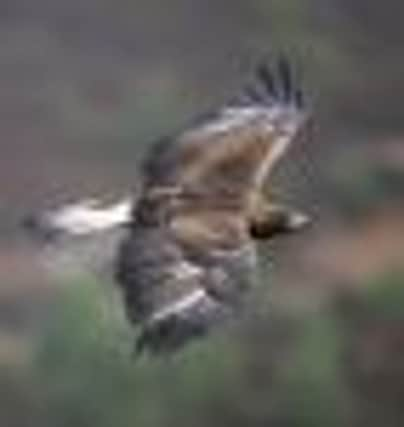Fall in bird of prey poisonings in Scotland


Three birds - two buzzards and a golden eagle - were poisoned illegally in 2012, down from 16 incidents the previous year.
There have been a total of 91 poisoning incidents since the Partnership for Action against Wildlife Crime (PAW Scotland) was formed in 2008.
Advertisement
Hide AdAdvertisement
Hide AdThe 2012 poisonings were recorded in the Grampian region, the west Highlands and the Borders.
The precise location is not given as some birds may be able to continue to fly before being struck down by the poison.
Mr Wheelhouse said: “I very much welcome the significant reduction in the number of birds of prey poisoned, which I hope signals the real change in attitude that is required to end this outdated and cruel practice.
“2013 is the Year of Natural Scotland and our birds of prey are both a vital part of the natural environment and a stunning spectacle which attract visitors to our countryside from home and abroad.
“It is our duty to protect them and I believe that new measures brought in by the Scottish Government over a year ago - which mean that landowners and managers can no longer turn a blind eye to offences against wild birds on their land - are a major deterrent to those who think they are above the law.”
PAW Scotland was formed five years ago after a review by police and prosecutors.
Progress
Vicarious liability was introduced by the Government in the Wildlife and Natural Environment (Scotland) Bill in 2011 to deal with landowners and managers who turn a blind eye to employees committing offences against wild birds on their land.
It came into force on January 1 last year and sentences can include fines and imprisonment.
Advertisement
Hide AdAdvertisement
Hide AdDouglas McAdam, chief executive of Scottish Land & Estates, and Duncan Orr-Adam, head of species and land management at RSPB Scotland, issued a joint statement. They said: “Any incident of illegal poisoning of birds of prey is one too many, however these latest figures represent the most substantial progress on this issue for many years.
“We are encouraged that these reported and confirmed incidents of illegal poisoning indicate a further decline in cases, building on progress in the figures for the previous two years.
“The strenuous efforts of those involved in PAW Scotland and those engaged with practical management on the ground are acknowledged.
“Both RSPB Scotland and Scottish Land & Estates are not complacent about this issue, however, and there will be no let-up in our joint efforts to eradicate illegal poisoning, and all other forms of wildlife crime.”
Anyone who finds a dead bird of prey, and suspects it may have been poisoned, are asked to contact police.